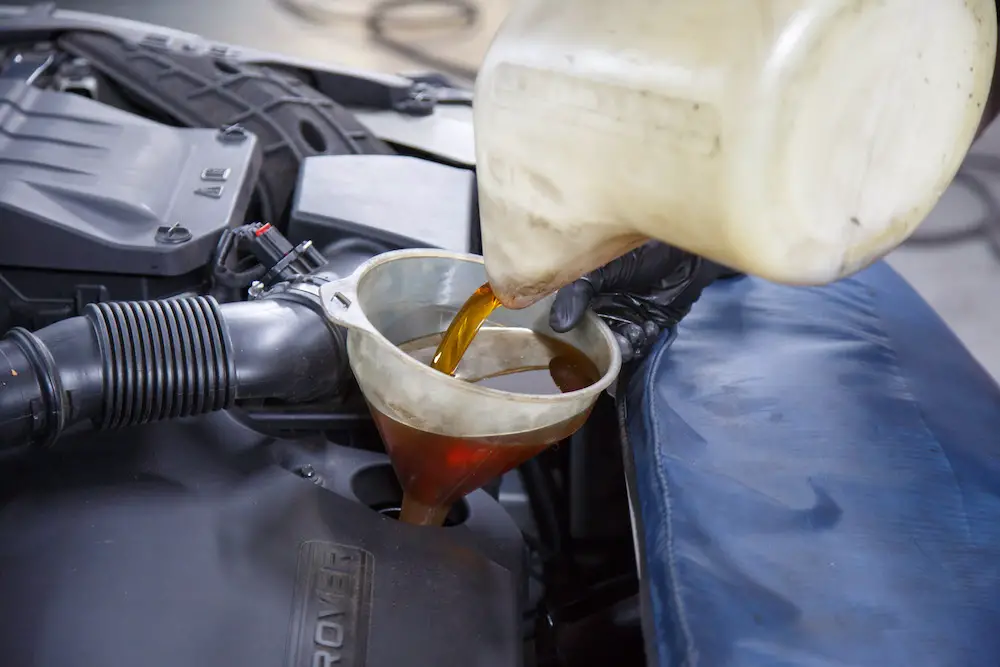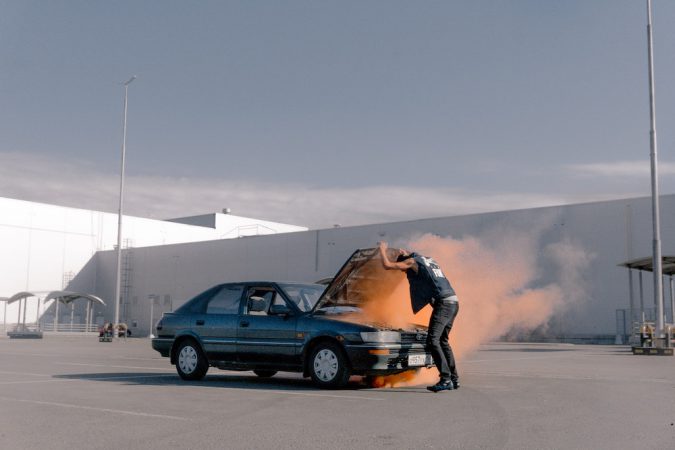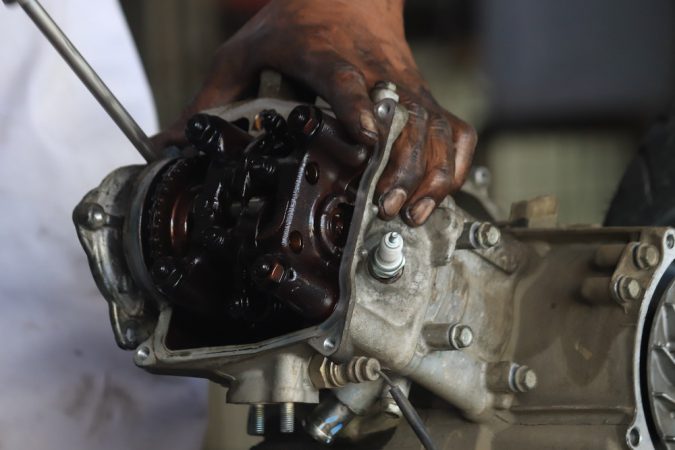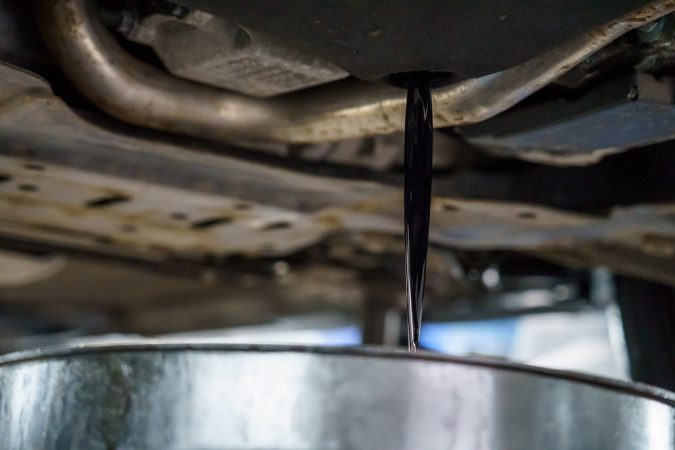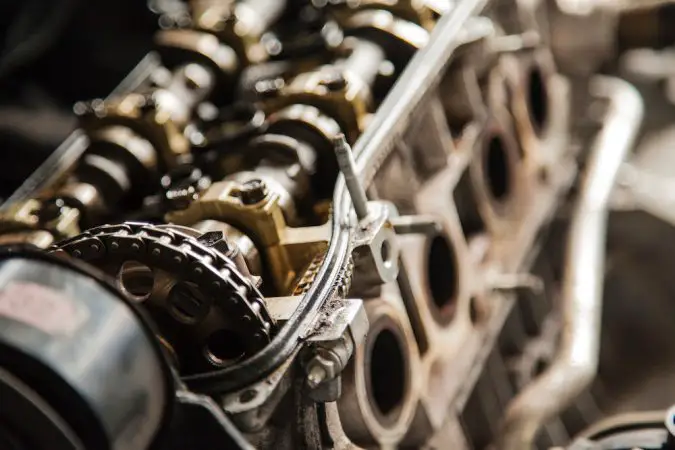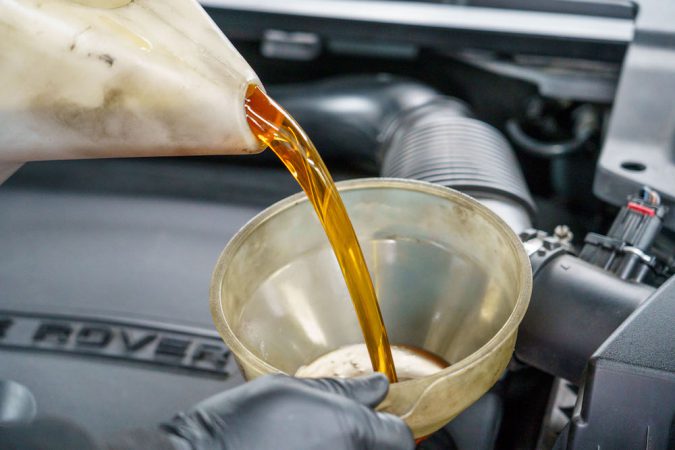Due to their complex nature, mechanical failures in automobiles are common and often unavoidable. When you see your car losing oil but no leak or smoke, it is difficult to pinpoint the problem without an extensive diagnosis from a certified mechanic.
Typically, cars lose oil when they are in use. The loss is typically due to a leak and not due to the engine using up all the oil in the car. The engine uses the oil for lubrication, and it doesn’t last forever.
It can indicate a few things, ranging from a worn gasket leading to leaks, faulty seals between cylinders and pistons, or a cracked head. This may cause serious problems for the engine and transmission if not addressed properly soon.
What Are The Functions Of Engine Oil?
Engine oils are necessary lubricants for the moving parts of an engine. They have a variety of functions. This includes improving the working efficiency of the engine, preventing rust and corrosion, cooling the engine, and preventing wear. Some oils contain additives to clean deposits from engines as well as improve fuel economy.
Engines need lubrication to function efficiently. The oil in the engine is used to reduce friction between moving parts. Thus, keeping metal parts from corroding, and keeping engines cool by drawing heat away from the engine. Engine oil also helps clean away dirt and extends the life of an engine.
Friction can cause components to wear out faster or break completely, which would require costly repairs. The oil keeps moving parts separated so they do not touch each other.
Engine Damage From Low Oil
When the oil level is low, the oil becomes too thick to circulate through engine parts. This can then lead to lower lubrication in some areas. This can cause friction, overheating, and increased wear on engine parts. Low oil can lead to catastrophic engine failure, which may result in a very costly repair for a smaller vehicle.
Engine damage from low oil is a result of the motor being starved for oil. Remember, the latter is a lubricant that reduces heat and friction. When there’s not enough oil in the engine, it can’t do its job as well. In addition to reduced performance, low levels of oil can overheat the engine over time. As such, causing more damage and may lead to catastrophic failure.
Car Losing Oil But No Leak Or Smoke – What Does It Mean?
In cars, it is often the job of the oil to coat metal surfaces and provide a thin layer of oil on which other parts can move without adding too much wear and tear. If oil is being used up quickly, then there may be a leak in a system somewhere.
An oil leak can be small or large. Leaks would make a car more expensive to run and also emit an unpleasant smell. In some cases, vehicles can lose oil without any signs of leakage or smoke as the engine gets too hot. This usually happens as a result of poor maintenance. Or, damage to the engine from external sources such as road debris.
Low oil levels can cause an engine to run at a temperature that is too high and overheat. The overheating will cause the engine to seize up. To avoid this from occurring, it is important to keep the vehicle’s oil level as high as recommended.
Can Car Losing Oil But No Leak Or Smoke Cause A Car To Shut Off?
A car can shut off due to low oil levels. If the only problem is low oil, then it might be just a warning that you should top up your oil soon. If there are other issues, then the engine will most likely malfunction and stop running altogether.
The oil lubricates the engine and prevents it from overheating and making metal-to-metal contact. When there is too little of this fluid, the metal can make contact and cause an engine shutdown.
Is Car Losing Oil But No Leak Or Smoke Possible?
The best way to check for oil loss in a car is to check the oil level. You can do this by observing the dipstick in the engine bay. If a vehicle has a sizable leak, there will be noticeable signs. For example, a puddle of oil on the ground or smoke coming from the engine.
However, a car can have oil loss, but without the typical leak or smoke that is associated with this issue. This can be due to an oil pressure sensor that is not functioning properly. The engine oil pressure sensor will sense when the engine is idle, which is when the crankcase pressure begins to drop. Without an external leak, it is difficult to determine the exact cause of the loss of oil.
There can be an oil leak without any visible signs of it. This is commonly due to the leak being below one’s line of sight. This is a common occurrence when the driver inspects the car on a lift or jack. And, it can also happen while driving if there is no smoke coming out of the tailpipe.
Oil leaks are not always visible, so drivers should routinely inspect their vehicles for oil leaks. They can do this by looking under them with a flashlight if they feel that oil is low.
What Causes Car Losing Oil But No Leak Or Smoke?
There could be a variety of reasons for this, which we will examine below:
1. PCV Valve Issue
A PCV valve forces any gases in the crankcase to circulate through the intake manifold where they are burned with fuel instead of being expelled into the atmosphere. The PCV valve seals off the crankcase from the engine, keeping oil in and air out.
A PCV valve issue can cause oil loss without any leak or smoke because the valve may be clogged. The crankcase ventilation system keeps oil vapors from coming into the engine through the intake manifold and also keeps oil droplets in the engine compartment from being purged into the outside air. If it is clogged or broken, the gas will escape into the engine’s intake manifold.
The valve prevents pollutants from entering the atmosphere and contaminating the environment, but it also prevents the release of crankcase vapors that could make their way to an external oil leak. This repeats itself every time the engine operates, causing a slow but steady waste of engine oil.
2. Worn Valve Seal
Many factors can wear down the valve seal. This includes over-tightening of the valve, washing the engine with an acid solution, or even too much time in between oil changes. When the valve seal is worn down, it pushes against the piston and creates a high wear rate on the inside of the cylinder. This also wears down the metal inside of the cylinder, which is what causes oil to leak or combust.
The worn valve seal can cause oil loss without any leak or smoke because the sealing metal and plastic components of the valve may become deformed and not seal tightly against the shaft of the valve. The oil then leaks past the valve and onto the engine, causing a higher risk of seizure and corrosion due to improper lubrication.
The loss could also happen by inhibiting the sealing capacity of the seal. The seal has several functions, including providing an airtight seal to prevent leakage of hot engine fluids into the coolant system, retaining lubricant within the engine, and minimizing friction between the valve and the guide.
3. Piston Ring Wear
Due to piston ring wear, oil loss can occur. In the rings, the depth of the skirt that seals against the cylinder wall changes. This change in depth will cause a change in compression because there is a difference in compression on either side of the ring. The result is an oil leak without any visible signs of smoke coming from the engine.
The rings create a seal between the cylinder wall and the piston, which prevents leakage of air and combustion byproducts. When a piston is pushed up into the cylinder, it creates a vacuum or negative pressure in the area behind it, sucking oil past the rings and into the space under high pressure. This oil then exits out of an opening at the bottom before reaching the top dead center.
As time goes on, the excess wear causes the rings to get torn away from the cylinder wall, which causes them to be unable to keep oil in. The rings are the only components of a piston that have contact with the cylinder head, and they control the seal of the combustion chamber.
4. Cylinder Wall Issues
There are a few ways that a cylinder wall issue can cause oil loss without the engine showing any signs of leaks or smoke. First, the piston rings could be loose and allow oil to pass through them. Another possibility is that there is some form of carbon buildup on the cylinder walls that is restricting airflow and causing excess pressure to build up in the engine. The high pressure causes the oil to leak out due to excessive hydraulic pressure.
If there is an issue with the cylinder wall, it can cause excessive damage. There could be low pressure and the engine will experience increased levels of wear and tear. In some cases, the cylinder wall may rub against the piston. This rubbing motion creates heat, which eventually generates enough pressure to force oil past the piston rings and into the combustion chamber. This means that there has been no leak or smoke, but there has been a lot of lubricating oil lost.
5. Faulty Head Gasket
A head gasket’s function is to seal the combustion chamber of an engine. The gasket can fail if there are cracks or holes in it, leading to a loss of compression on one side of the sealing face. This problem allows for the escape of some gases, which will then leak into the engine oil and cause it to break down over time.
A faulty head gasket can cause oil loss without any leak or smoke if the gasket is acting as a sponge. The gasket will absorb fluids due to their high surface tension and release them if the fluid doesn’t have a high enough surface tension.
6. Circuit Related Issue
A circuit-related issue can cause oil loss without any leak or smoke. This would happen if the vehicle’s various electrical systems, which need to work properly for oil to be pumped from the engine to the various destinations it needs, malfunction. If this is the case, then there would be a lack of pressure in the oil pump and a lack of pressure in certain parts of the engine and other parts of the car.
Through the use of an engine’s connecting rods, circuit-related issues can cause oil loss. Rods, which are found in each cylinder, use magnetic pulses to activate the loss of oil. This occurs because oil is typically located near these rods, and when they are activated, the oil is dispersed into the air intake of the vehicle.
If the ECU is not supplying enough voltage to the car, then the oil pump may not be getting enough pressure. Without sufficient pressure on the oil pump, it can’t effectively push oil into the mechanical pumps that pressurize the system. This would cause the engine to overheat and possibly lead to major heat damage, resulting in an oil leak.
7. Dirty Oil
It is possible that dirty oil can cause an engine to lose oil with no signs of a leak or any smoke if the dirty engine oil cannot disperse and lubricate as well as clean engine oil. This can be caused by the oil becoming encrusted with dirt and other foreign particles that block the passage of oil, or just by worn-out seals that allow more pressure on the clean side than on the dirty side.
Dirty oil can cause oil loss in a car with no signs of a leak or any smoke. The dirt could get into the engine and coat the bottom of the motor walls or other parts, which would lead to wear and tear on these components. This wear and tear could result in oil leakage and can be difficult to detect without noticing any smoke coming from the engine.
8. Internal Engine Damage
Internal engine damage can cause oil leaks that are not externally visible. If the car has any sort of engine damage, this can create a leak that will not produce any visible smoke or fluid on the outside of the vehicle. This can also happen when the piston rings get worn and loose, causing an energy loss that needs to be compensated for by adding more oil.
9. Small Holes
An engine can leak oil internally without the driver observing any external leaks or smoke. This occurs when there is a small hole in an oil seal that does not allow enough pressure to escape for the car to produce visible leaks. These small holes are more common in older cars, especially if they have sustained some type of damage, which may be difficult to detect on the outside.
10. Camshaft
If a car experiences camshaft issues, it may also experience issues with leaking fluids. In this case, the engine oil is most likely going to be the only fluid that leaks out. Engine oil is not going to typically emit any smoke or have a noticeable smell when it leaks. For the oil to leak from a camshaft issue, there would need to be some sort of physical defect in the engine itself in addition to the camshaft issue.
Camshaft issues can also cause oil loss in a car without any sign of a leak or smoke. This is because the oil is used as a lube that the camshaft needs to rotate smoothly and control engine timing. Inadequate lubrication will result in wear and, eventually, failure of the camshaft bearings.
11. Problems With The Timing Chain
A timing chain issue can be a potential cause of oil loss in a car without any signs of a leak or smoke. With a worn timing chain, the chain’s tensioner may become loose and, over time, will lose some slack. In turn, this can account for larger gaps between the chain and sprockets. The movement of the chain over the sprockets is what causes the noise that is often associated with this issue.
In many cases, the timing chain is located in a warm area of the engine and provides periodic contact with engine oil. If this chain fails, it can cause a major drop in oil pressure and eventually lead to a loss of oil. So by checking for signs of a leak or if smoke ever appears from the car’s exhaust, there may be an issue with the timing chain.
12. Decrease In Engine Compression
An oil loss may also be the result of a decrease in engine compression. A high-pressure fuel system problem could cause the oil to burn before it reaches the engine, or an issue with the intake or exhaust system can result in fuel dilution of the oil, which leads to decreased engine performance and efficiency.
What To Do When Car Losing Oil But No Leak Or Smoke
In the event of an oil loss, one needs to check the oil level and add more if needed. Oil may be lost when the engine is overheating or running hot for a long time.
In the event of an oil loss from a car engine, it is best to address the problem by consulting a service center or a mechanic. In the meantime, it is recommended not to drive the car and get it pulled off of the road.
If you notice a significant oil loss in your car while driving, then you should immediately pull over and shut off the engine. Run the car until the oil warning light goes out, and then turn it back on again. If the problem is not solved yet, contact a mechanic or take your vehicle to an auto repair shop for diagnosis.
Car Losing Oil But No Leak Or Smoke Repair Cost
The cost of engine oil leak repair for a car varies depending on if the job has been completed already, the size and type of leak, and the level of difficulty. For instance, an easier oil leak such as one from a rear main seal only costs $200 to fix, while a difficult oil leak such as one from a crankshaft or cylinder head costs closer to $500 to fix.
The cost of repairing oil leaks can vary depending on the severity and location of the leak. Furthermore, if the car is very old, you may need to replace major parts of the engine rather than just fix the leak.
The cost of an engine oil leak repair is dependent on the severity and location of the leak itself. If the leak is found to be coming from a seal, it will cost less than if it was coming from a gasket. Seals usually range under $200, while gaskets would be closer to $400-$600.
The estimated engine oil leak repair cost for a car also depends on the car’s make and model. If this needs to be done quickly, then it will cost more because of the labor necessary to do so.
Car Oil Issues Facts:
- If you notice that your car is losing oil but there is no visible leak, it could be due to a worn seal or leaky rings that may be the root cause of the issue.
- Burning oil is another possible cause for low oil levels in your car, which happens when oil seeps into the combustion chamber due to faulty engine parts.
- Blue-tinted smoke coming from the exhaust is an indicator of oil burning, although it may not always be visible.
- It is normal for some cars to burn more oil than others, but it is best to have your vehicle serviced as soon as possible if you consistently experience low oil levels.
- Older cars with over 100,000 miles on the odometer are more susceptible to serious engine damage and expensive repairs due to the excessive loss of oil.
- Vehicles with fewer than 50,000 miles should typically use no more than a quart of extra oil between changes.
- Low-viscosity oil such as 5W-20 used in newer engines can lead to oil entering the combustion chamber due to even small amounts of wear on engine parts.
- A clogged PCV system, worn-out piston rings or cylinder walls, and a faulty valve seal are common causes of excessive oil consumption that can lead to low oil levels in your car.
- Replacing the PCV valve can resolve oil blowback caused by a clogged PCV system, but worn-out piston rings, cylinder walls, or valve seals can require costly repairs.
Car Losing Oil But No Leak Or Smoke – Conclusion
It is important to note that there are many ways a car can lose oil pressure. Once you notice the telltale signs of any of these issues, you need to get your vehicle checked as soon as possible.
The sudden decrease in oil levels can lead to more significant problems. Hence, keep an eye on your oil level gauge, and if you notice it is below the minimum mark, stop immediately for an inspection. If you are unable to get your vehicle inspected right away, make sure you are checking the oil level often and keep a close eye on your engine temperature.

